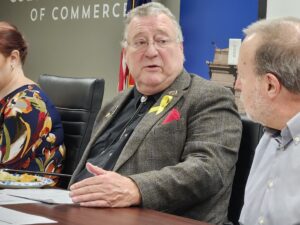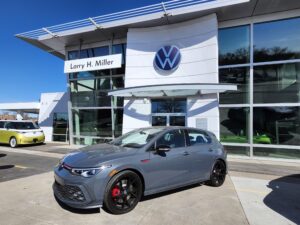Colorado legislators are being asked to referee a dispute between startup electric vehicle brand Scout Motors and the state’s Volkswagen auto dealers — a dispute whose outcome could shape enforcement of the state’s franchise dealer law for decades to come.
Scout Motors, which will make electric trucks and SUVs in South Carolina and begin selling them in a couple of years, got an “early and large” seed investment from Volkswagen but exists independently from VW Group of America, said its Colorado lobbyist, Shannon Fender. Volkswagen dealers argue that those deep ties to the German automobile manufacturer makes Scout an affiliate of VW and gives them the exclusive right to sell the trucks and SUVs in Colorado — a claim that Scout denies.
Senate Bill 160, sponsored by Democratic Sens. Marc Snyder of Manitou Springs and Iman Jodeh of Aurora, would define an “affiliate” of a manufacturer and clarify that vehicles made by affiliates must be sold through dealerships aligned with the manufacturer. The bill passed the Senate on a bipartisan 22-12 vote in mid-March and is set for its first hearing in the House Business Affairs and Labor Committee on Wednesday morning.
As March 6 testimony in the Senate Business, Labor and Technology Committee showed, the bill right now focuses on the fight between VW dealers and Scout, which plans to sell directly to customers in Colorado, like fellow EV companies Tesla and Rivian. A 2020 state law allowed firms such as those two to bypass the state’s dealership requirements if they are startup firms without connections to existing manufacturers.
A fight that extends well beyond VW dealers

Colorado state Sen. Marc Snyder speaks to the Colorado Chamber of Commerce Tax Council in February 2024.
But dealers warned at the committee that it’s likely this is not the last battle over whether a company with heavy financial investment from a traditional manufacturer is a startup, particularly as Honda bought defunct brand Afeela and may be looking at a similar strategy. Thus, SB 160, far from being a niche bill impacting just those who sell and buy Volkswagen-connected vehicles, could set the standard for how separate “startup” companies must be from the manufacturers that help finance them in order to operate independently.
Leaders from the Colorado Automobile Dealers Association say, in fact, that the bill is a could determine whether the state’s 271 dealers and their roughly 44,000 employees have a future in Colorado or whether a new generation of vehicles will be sold without them. And, thus, like bills impacting car dealerships that have come before the Legislature over the past two decades, SB 160 is raising emotions, rhetoric and fears as supporters and detractors prepare for a showdown in the bill’s second legislative chamber.
“Manufacturers need dealers and dealers need manufacturers. I’m concerned that without our local state laws that even this playing field, manufacturers can exert their control and impose rules on dealers,” said Randy Earnest, an attorney with Fairfield and Woods who represents auto dealers. “The state isn’t passing a new law. This addition is intended to be a clarification. Manufacturers, they are the 500-pound gorilla. They can impose their will on the local dealers.”
The exception for startup auto companies
Colorado’s dealership laws, like those in many other states, are intended to ensure that consumers have a local point of contact for one of the pricier purchases they will make — and have someone they can go for service needs and other questions. Manufacturers must sign contracts with dealers giving them specific territory in which they can be the exclusive seller of their products — a distinction that dealers have used to plant roots in local communities by employing workers and sponsoring events.
Newer EV manufacturers, however, are launching with a model that they say will cut costs by selling vehicles directly to the public, sometimes forgoing both local showrooms and local service centers. State leaders like Colorado Energy Office Director Will Toor support this, saying that boosting the number of EVs on roads is key to meeting emissions-reduction goals, which makes it vital to make it as easy as possible for automakers to sell their products in this state.
International Harvester launched the Scout line of off-road trucks in 1959 and ran it through 1980, shutting it down for more than 40 years before Volkswagen AG acquired the parent company of the defunct brand in 2021. The next year, Volkswagen announced that early and large investment into the reborn brand of electric trucks and SUVs, which would be designed in Michigan and manufactured in South Carolina.
“It’s not up to them”
Fender told the Senate committee that Volkswagen did not invest specifically in the South Carolina plant, showing that it was not a direct owner of Scout — a difference that could allow the brand to enter the state under the 2020 law and sell directly to consumers. In fact, the new Scout business model parallels its former life, as those trucks were sold not through dealers but through agriculture stores like farm equipment by a parent company that was known more for its tractors and farm vehicles, she said.
Because of that, Scout has no plans to sell through franchised dealers in Colorado and, if SB 160 passes, would likely require Coloradans to travel to another state to buy its products. The requirements of the bill also would jeopardize Scout’s plans to put a centralized service center in Colorado, she said.
“Current law allows us to enter the market … We set up our business plan based on current law,” Fender said. “As much as (VW dealers) would like to sell Scout vehicles, it’s not up to them to determine who gets to sell our vehicles.”
But SB 160 would make that determination in many ways, as it amends the definition of manufacturers to include affiliates and states that both manufacturers of non-exempted startups and their affiliates must sell products through dealerships in Colorado. And it defines affiliates as any person or entity that either directly or indirectly is controlled by a manufacturer and that manufactures, distributes, sells or offers for sale or lease new motor vehicles to retail customers.
Dealers defend current system

A car rests in front of Larry H. Miller Volkswagen Lakewood.
Alex Young, general manager for Larry H. Miller Volkswagen Lakewood, said that with 88% of new vehicles sold in Colorado in the first quarter of this year being light trucks or SUVs, VW customers have been waiting for a long time for the manufacturer to produce a truck. Not only is the Scout a key to his dealership and other VW sellers remaining competitive in this state, but it is also key to meeting a state mandate that 82% of vehicles sold by dealers by 2032 must be electric.
Neither Young nor other dealers could identify for the Senate committee why Scout wouldn’t want to go through their network and long waiting list of customers. But if the VW-backed manufacturer were allowed to sidestep its dealership commitments today, it could set off a cascade of other manufacturers deciding to cut out the middleman and sell new products such as EVs or future hydrogen-fueled vehicles directly, which could lead to massive losses of sales and jobs that state law is designed to avoid.
“We don’t ever want to be in a competitive situation with our manufacturers,” said Steve Powers, vice president of operations for McDonald Automotive Group, which operates the third-oldest VW dealership in the country. “It could be any of our manufacturers tomorrow.”
Would bill hurt emissions-reduction push?
Once again, environmental groups and state leaders are siding with the EV manufacturer over those who say they are bound by state law.
John Opika, deputy director of the Colorado Department of Revenue’s auto division, said the definition of “affiliate” in SB 160 is so broad that it raises questions of whether Ford-backed Rivian would now have to be sold through that manufacturer’s dealerships. Travis Madsen, transportation program director for the Southwest Energy Efficiency Project, said the bill would reduce consumers’ access to electric vehicles and put new companies on an uneven playing field with established company Tesla.
And, as might be expected in a bill with connections to Elon Musk’s Tesla brand, politics has kept into the discussion. Sen. Julie Gonzales, D-Denver, voted against SB 160 after failing to pass an amendment that would have revoked the ability in current law to sell directly to customers for any car manufacturer “that actively undermines American democracy and publicly refers to the federal Social Security program as a Ponzi scheme.”
Dealers say bill is about preserving, growing jobs

Colorado state Sen. Iman Jodeh speaks on the Senate floor early this session.
It’s possible that the remaining debate could come down to the specifics around definitions. Sen. Nick Hinrichsen, one of the 11 Democrats who opposed SB 160, said that he believes Scout truly is an independent company that never was subject to dealership laws and should remain that way.
Backers, however, say the bill is needed to defend Colorado’s dealership system and the larger benefits it has not only for the state economy but for the people who buy vehicles.
“We’re also talking about 44,000 Colorado jobs … that help buyers make very informed decisions,” Jodeh told the committee. “I understand that this is the face of how we buy our cars — not only how we buy our cars, but the kind of cars they want to buy. We’re asking our manufacturers to allow the dealers to be that proxy.”
SB 160 is scheduled fourth on the Wednesday morning agenda for the committee, which is set to meet whenever the House adjourns its floor work for the day. The hearing is scheduled in House Committee Room 112.
